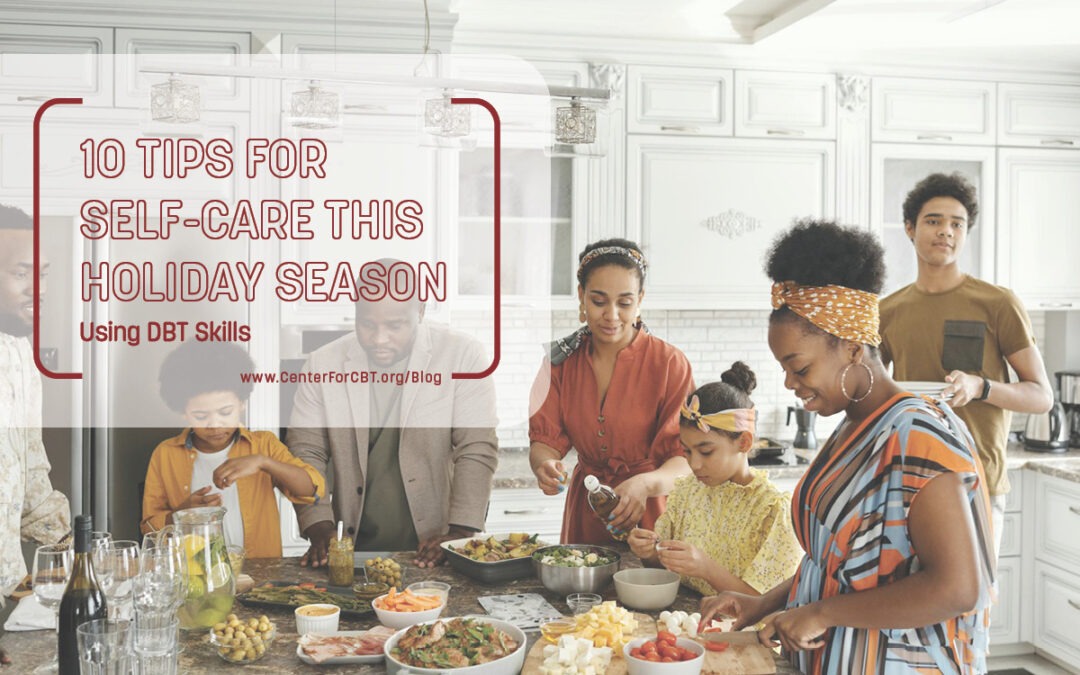The holiday season is often called “the most wonderful time of the year.” For many, it brings joy and excitement. However for others, it can be a significant source of stress and anxiety. According to the American Psychological Association (2020), 89% of Americans report feeling overwhelmed or stressed during the holidays. The DBT skills like PLEASE and Cope Ahead skill can teach you tips for incorporating self-care during the holidays, managing time-sensitive responsibilities, and how to avoid over-extending yourself.
From managing gift shopping and hosting guests, to cooking meals and navigating complex family dynamics, the demands can feel unrelenting. If you find yourself dreading the holidays or struggling to cope, you’re not alone. The good news is that there are evidence-based strategies you can use to manage stress and anxiety, prioritize self-care, and navigate challenges.
DBT PLEASE Skills: 5 Tips for Building Emotional Resilience
The best way to prepare yourself for the flurry of holiday activity is to employ foundational DBT skills sets like the PLEASE skill. These strategies are designed to reduce vulnerability to intense emotions by focusing on physical and emotional wellbeing.
While the holidays are notoriously a time to indulge, keeping these DBT skills in mind can help you better understand your limits. When it feels like stress and anxiety is mounting, turn to these five tips to practice self-care so that you can make it through the holiday season without feeling burned out:
1. PL – Treat Physical Illness
Attending to your physical health ensures you’re better equipped to manage holiday stress. When you’re unwell, irritability and stress tolerance decrease. During the holidays, it’s crucial to stay on top of medications, take vitamins, and schedule checkups. If you’re feeling under the weather, prioritize rest and follow medical recommendations to recover.
2. E – Balanced Eating
Maintaining balanced eating habits prevents emotional vulnerability. While holiday treats are a delightful part of the season, consuming excessive caffeine or sugar can affect mood and energy levels. Aim for regular, nutritious meals that support both your physical and emotional stability. Striking a balance between indulging in festive goodies and maintaining healthy eating patterns helps you stay present and grounded.
3. A – Avoid Mood Altering Substances
Alcohol or other substances may provide temporary relief from stress but can exacerbate emotional challenges in the long term. If you choose to drink, moderation is key. Reflect on how alcohol or other substances impact your mood and behavior. Awareness of their effects can help you navigate social situations while maintaining emotional stability.
4. S – Balanced Sleep
Sleep is a cornerstone of emotional resilience. Practicing good sleep hygiene—such as establishing a consistent sleep schedule, limiting caffeine intake, and avoiding screens before bed—can improve the quality of your rest. Adults typically need 7–9 hours of sleep, while children and teens may require 8–12 hours, depending on their age. Prioritizing sleep during the holidays enhances your ability to cope with stress.
5. E – Get Exercise
Regular physical activity activates the parasympathetic nervous system, promoting relaxation and reducing stress. Whether it’s walking, yoga, or playing a team sport, find activities you enjoy and can incorporate into your routine. Aim for 20–30 minutes of movement daily to boost emotional resilience and overall well-being.
Implementing DBT skills like the PLEASE skill doesn’t have to happen all at once. Start with small, manageable changes and gradually build on them. Self-care is a journey, not a race. These skills are the building blocks for building emotional resilience to manage feelings of stress and anxiety. They can be used with other DBT skills and strategies to help address specific challenges you may face during the holiday season.
DBT Cope Ahead: 5 Tips to Address Holiday Stress
The cope-ahead strategy is a DBT skill that prepares individuals for challenging situations by outlining steps to manage emotions effectively. Creating a cope-ahead plan involves several steps:
1. Describe the Situation
Clearly identify circumstances that may trigger intense emotions. Be specific about potential thoughts, emotions, and behaviors that could arise.
2. Select Coping Skills
Choose strategies to help you navigate the situation. These might include deep breathing, grounding techniques, or interpersonal effectiveness skills. Write out how you will apply these tools.
3. Visualize the Scenario
Imagine the situation as vividly as possible, picturing yourself using your chosen coping skills effectively.
4. Rehearse Your Plan
Mentally practice your responses, including how you’ll handle challenges or worst-case scenarios. Rehearsing builds confidence and readiness.
5. Decompress After Rehearsal
Engage in relaxation techniques, such as mindfulness or self-soothing exercises, to release any tension following your rehearsal. Some relaxation techniques include the IMPROVE and self-soothe DBT skills.
How to Manage Holiday Responsibilities
The holiday season often brings an avalanche of time-sensitive tasks. Even with your ten DBT skills in mind, balancing these responsibilities can feel overwhelming. To help yourself get the most enjoyment out of the holiday season, here are some additional strategies to help you effectively manage your list of responsibilities:
Avoid Overcommitting
It’s tempting to say yes to every invitation or opportunity, but overextending yourself can lead to burnout. Focus on the traditions and events that bring you the most joy. Remember, it’s okay to decline activities that feel more like obligations than opportunities for connection.
Set Boundaries
Communicating clear boundaries with family, friends, or colleagues can reduce holiday stress. For example, if hosting guests is overwhelming, consider delegating tasks or limiting the guest list. Setting boundaries allows you to preserve your energy for meaningful interactions.
Take Breaks
Scheduling downtime during the holiday rush is an act of self-care. Engage in relaxing activities such as reading, meditating, or taking a walk. Allowing yourself moments of rest improves your capacity to handle responsibilities effectively.
Ask for Help
If the demands of the season feel unmanageable, reach out to trusted friends or family members for support. Sharing responsibilities or simply expressing your feelings can alleviate stress. If you’re struggling with persistent anxiety or depression, consider seeking support from a mental health professional. Therapy can be an invaluable resource for managing holiday challenges.
The holiday season can be a time of joy, connection, and celebration, but it can also bring stress and emotional challenges. By incorporating DBT skills like Please and Cope Ahead, you can navigate this busy time with greater ease. Remember to set realistic expectations, prioritize self-care, and seek support when needed. Wishing you a peaceful and fulfilling holiday season from the Center for Cognitive Behavior Therapy!





